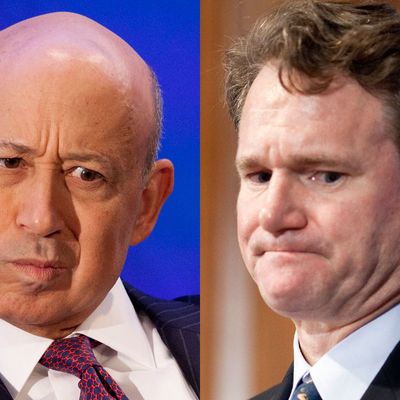
Quite a 24-hour stretch on Wall Street, no?
First, Goldman Sachs reported better-than-expected results that were still pretty meh (although the report created the Wall Street Journal headline, “Goldman Suffers a Solid Quarter,” which is better than anything I could have come up with). Then, out of nowhere, Vikram Pandit “stepped down” as CEO of Citigroup. This morning, capping the madness, Bank of America reported earnings of $340 million, or “zero cents a share,” if you’re a fan of rounding.
Let’s take these one by one, shall we?
First: Goldman Sachs.
The two scariest words at 200 West Street right now are probably “Greg Smith.” The third- and fourth-scariest words are probably “risk off.” Embedded within Goldman’s third-quarter earnings report — which showed $1.46 billion in net income and $8.35 billion in revenue, yada yada — was this tidbit:
Goldman’s traditionally powerful trading engine slowed to a hum in the third quarter, with the company putting less money at risk in the markets on an average day than it has at any time since 2005. Value at risk, a widely followed measurement, fell 21% to $81 million in the quarter ended Sept. 30 from $102 million a year earlier.
What’s happening, at Goldman and all over Wall Street, is that bank executives are realizing that they are essentially blindfolded when it comes to handicapping the fallout from big economic events. Markets aren’t behaving in predictable, correlated ways, and as outgoing Goldman CFO David Viniar noted in yesterday’s earnings call, “a speech by Politician X or Politician Y drives markets up or down as much as any economic situation.” It’s hard to take big risks in a world like that, so if you’re Goldman, you’re probably happier with your traders playing it safe and keeping VaR low, even if it means not winning big, either.
Goldman made money on mortgage trading despite the departure of Donald “Serious Money” Mullen, and its private equity portfolio also recovered from a bad year last year. So it’s not totally Screwed. But with Greg Smith already scheduled to bash the firm on 60 Minutes, Piers Morgan, and myriad other media outlets next week, it’s not totally Not Screwed, either.
Bank of America:
Here is what you need to know about Bank of America Merrill Lynch: This morning, the bank reported an effective quarterly profit of zero cents a share, and its stock is up more than one percent. To rephrase: Investors are pleased that Bank of America made no money, as opposed to losing money like they expected. Forget pre-debate spin rooms — the presidential candidates should bring Brian Moynihan in for lessons in expectations management.
The nominal reason BofA made no money last quarter was that it had to pay $2.4 billion to settle a lawsuit over charges it misled investors in the days surrounding its 2008 acquisition of Merrill Lynch. (There was also some stuff about a British tax bill.) But the larger issue is that Bank of America, for the last several years, has been essentially Perma-Screwed as a result of its acquisitions of Countrywide and Merrill during the financial crisis, which gave it bunches of legal albatrosses to deal with and no clear path out of the woods.
Still, the bank may be finding its way. It seems to have gotten a Moyni-handle (see what I did there?) on its legal woes, and investment banking revenue is up for the first time in God knows how many quarters. The housing recovery will also help matters, since Bank of America, unlike Goldman, underwrites a bunch of mortgages.
So, in the dual spirits of patriotism and optimism (USA! USA! USA!), I award Bank of America a tentative Only Mostly Screwed.
Citigroup, redux:
So, yesterday, we compared Citigroup to Pig-Pen from the Peanuts, because of all the dirt that has hovered around its head since the financial crisis.
Welp. Turns out Citigroup is actually more like Lucy Van Pelt, since, right when we thought we had a handle on what Citigroup was up to and how its plan to shrink itself to profitability was going, WHOOSH, there goes the football.
Shareholders and analysts seem to think that new CEO Michael Corbat, who was announced as Vikram Pandit’s replacement yesterday, will do great things to restore Citi to greatness, or at least do better than Pandit. But somehow, if I’m Citi board chairman Michael O’Neill, I think I put “push out finance Ph.D. who willingly took $1 salary for two years, replace with guy who does the Spartacus workout and quotes Spider-man” pretty far down on my to-do list.
More troubling, though, was the bank’s conference call yesterday about the sudden changes. The call was a piece of surrealist performance art and revealed less than nothing about why, mid-recovery, the bank’s board decided to clean house. The only thing hollower than O’Neill’s equivocation was Pandit’s claim that he had left of his own accord.
For opacity and sheer chutzpah, we’re re-ranking Citigroup one notch lower, as Very Screwed.
































